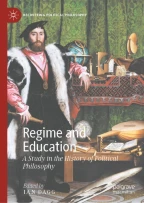
This essay examines the civic education provided by Rousseau in The Social Contract. After rejecting a variety of claims to legitimacy, Rousseau concludes that the foundational condition of legitimacy is the thoroughgoing suppression of individuality. While Rousseau claims that all regimes justify themselves on grounds of the divine origin of law, he deflates this justification for the purpose of establishing his own natural religion. Rousseau also deflates the importance of the question of regime. By focusing on the amount of territory a political organization holds to determine what regime would be best for it, Rousseau suppresses the claims to justice implicitly or explicitly made by different types of regimes. Finally, he discusses a number of Roman institutions as a way of showing how his astonishing demands on the political order can be diluted within the realm of practical politics.
This is a preview of subscription content, log in via an institution to check access.
eBook EUR 96.29 Price includes VAT (France)
Hardcover Book EUR 126.59 Price includes VAT (France)
Tax calculation will be finalised at checkout
Purchases are for personal use only
Jean-Jacques Rousseau, The Social Contract, trans. Victor Gourevitch (Cambridge: Cambridge University Press, 1997), 40. Parenthetical citations refer to book, chapter, paragraph.
This includes the putatively “free State” of Geneva (I.introduction.3). See Hilail Gildin, Rousseau’s Social Contract: The Design of the Argument (Chicago: University of Chicago Press, 1983), 9.
This is an inadequate rejection of claims made on behalf of (divine) authority. See Heinrich Meier, Political Philosophy and the Challenge of Revealed Religion, trans. Robert Berman (Chicago: University of Chicago Press, 2017), 119–120. Rousseau openly rejects such claims in a dogmatic fashion; however, the work taken as a whole is meant to show the true justification of such a rejection, and this justification is no less allegorical than the one found in Machiavelli’s Discourse on Livy. The justification of the rejection of authority as authority can only occur after authority as authority has already been rejected on inadequate grounds. Rousseau’s work mirrors the thought process the individual will have to undergo to justify rejection of authority as authority. For an excellent consideration of Rousseau’s rejection of (divine) authority, see “The Right of Politics and the Knowledge of the Philosopher: On the Intention of Jean-Jacques Rousseau’s Du Contract Social,” in Political Philosophy and the Challenge of Revealed Religion.
This claim is contradicted by the presentation of the “difficulty” in which Rousseau acts as though each individual will “remain as free as before” (I.6.3–4); however, it is impossible to legitimize slavery and to remain as free as before. At least one of the two claims has to be considered a rhetorical exaggeration and the evidence points to the second claim being a “pious fraud” (Meier, 122).
Jean-Jacques Rousseau, Emile, trans. Allan Bloom (Basic Books, 1979), 40. Contrast Gilden, 144–145.Contrast with Meier, 129–131, especially 130n24 as well as 167. Cf. Gilden, 44, 55–57, and 164 as well as Roger D. Masters, The Political Philosophy of Rousseau (Princeton, NJ: Princeton University Press, 1968), 326.
Cf. “Rousseau’s Critique of Liberal Constitutionalism” by Allan Bloom in The Legacy of Rousseau, eds. Clifford Orwin and Nathan Tarkov (Chicago: University of Chicago Press, 1997), 163 as well as “Rousseau and the Origins of Nationalism,” by Marc F. Plattner, 193–194 within the same volume.
These claims are compatible with claim that multiple “lawgivers” are needed in a process of founding over time that cannot end with the initial lawgiver. Leo Strauss observes in Natural Right and History (Chicago: University of Chicago Press, 1950) that “society has a continuous need for at least an equivalent to the mysterious and awe-inspiring action of the legislator” and that “Rousseau’s doctrine of the legislator is meant to clarify the fundamental problem of civil society rather than to suggest a practical solution, except in so far as that doctrine adumbrates Rousseau’s own function” (287–288, my italics). Also see Gilden, 73–74.
Cf. Gildin, 41–42. Cf. Masters, 340–348.There is a tendency among Rousseau’s readers, encouraged by the rhetorical motion of Rousseau, to exaggerate Rousseau’s attachment to the republican form of government by conflating his formal definition of republican government with the form of government most people envision when speaking of republican, for example, see “Rousseau and the Origins of Nationalism,” 194. Leo Strauss takes advantage of Rousseau’s equivocal use of “republic” to attack him as more radical than is the case; the subsection on Rousseau in “The Crisis of Modern Natural Right” is misleading and polemical in a way that mirrors the inflammatory rhetoric of Rousseau: Strauss, Natural Right and History, 277n44. Cf. Meier, 155–156 with 159.
Gilden, 116–117.Leo Strauss begins his essay “On the Intention of Rousseau,” Social Research 14, no. 4 (December 1947) by observing that Rousseau “considered himself the first theoretician of democracy,” 455.
Rousseau himself prescribed a federated representative democracy to Poland, albeit one that included binding instructions. See “Rousseau and the French Revolution” by François Furet, 173 with “Rousseau and the Theory and Practice of International Relations,” by Pierre Hassner, 208 in Legacy of Rousseau as well as Masters, 339.